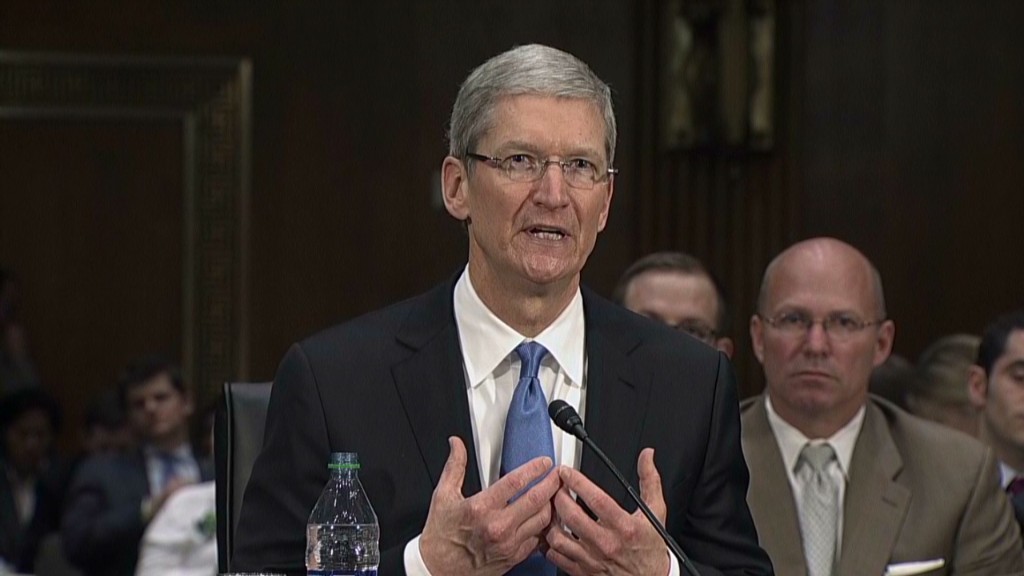
The fuss over Apple's complex strategies to avoid taxes put the corporate tax code on display in all its convoluted glory this week.
It so happens that one of those strategies is among the "worst" corporate tax breaks identified by experts surveyed recently by CNNMoney.
What makes a bad tax break? There's no single definition. Some encourage companies to do dumb things just to save money on their tax bill. Some allow a business to escape paying tax on income that any reasonable person would agree should be taxed. And others are just so badly set up by Congress that they make tax planning a nightmare.
Here are five of the top picks from the experts surveyed:
Claim the 'chicken poop' credit: Okay, it's really called "Section 45." This tax credit may be taken by businesses that produce electricity using certain renewable resources.
That includes chicken poop, said Len Burman, the incoming director of the Tax Policy Center.
"It's a total windfall for chicken producers," he said.
Federal rules already bar chicken farmers from polluting the water when disposing of "poultry litter," Burman explained. Burning it to create electricity is a low-cost way to comply with those rules.
"It serves no recognizable social objective and is an example of misguided industrial policy that pervades the code," Burman said.
The Joint Committee on Taxation estimates the tax break will cost federal coffers $9.7 billion over five years.
Deduct "manufacturing": The "domestic manufacturing deduction" is one of the biggest business tax breaks on the books, and it gets a nearly unanimous "boo!" from tax experts.
It lets companies deduct from their income tax 9% of the cost of qualified manufacturing expenses.
Related: How Apple scores a lower tax bill
While the United States has increasingly become a service economy, come tax time, many businesses will claim they "manufacture" something that qualifies for the deduction.
"Every industry finds a way to take this deduction. Grinding coffee and making hamburgers become manufacturing," said William McBride, chief economist of the Tax Foundation.
Making movies qualifies too, Burman said. But apparently the scones made by the place that grinds the coffee would not.
To be eligible for the deduction, the manufacturing must occur "substantially" in the United States. "Substantially" means "at least 20%."
"It seems difficult for some people to understand how 'at least 20%' can be 'substantial,' therefore leading to more confusion," said enrolled agents David and Mary Mellem, who represent taxpayers before the IRS.
The manufacturing deduction is one of the most expensive business tax breaks, costing federal coffers an estimated $78.2 billion over five years.
Depreciate assets: Businesses may write off the cost of equipment and sometimes intangible property such as computer software.
What's aggravating to the Mellems is the perpetually changing rules governing depreciation. "Thirty-five years ago the depreciation rules were logical. They required a taxpayer to spread the cost of an asset over the asset's anticipated useful life," they said.
Since then, however, lawmakers have defined and redefined the "useful life" for different assets. They've set, then reset and set again the maximum dollar amounts on costs that can be written off. They've created different types of temporary "bonus depreciation" for some assets for limited periods that then get extended ... temporarily.
Shift profits offshore: U.S. multinationals, like Apple (AAPL), can enter into "cost-sharing agreements" with their offshore subsidiaries in low-tax countries to pay for things like research and development conducted in the United States.
That, in turn, lets the subsidiaries enjoy the economic benefits that result from the R&D -- namely the profits from the intellectual property that's created, noted Martin Sullivan, chief economist at the publisher Tax Analysts.

The problem, Sullivan and other tax experts say, is that the subsidiaries may get a sweetheart deal for their R&D investment -- the kind of deal that the company wouldn't give to an outside entity that might want to get in on the ground floor of the next great product.
Given the intangible value that the U.S.-based business provides to the subsidiary -- namely the facilities, talent and know-how to conduct R&D -- the subsidiary may pay less than a fair-market price for the profits it books. That seems to be what happened with Apple's subsidiaries in Ireland, Sullivan noted.
The end result can be billions of dollars in profit that escapes U.S. taxation for years because it's parked offshore indefinitely.
Borrow from a low-tax subsidiary: This next maneuver is what Sullivan's colleague Lee Sheppard at Tax Analysts calls "the big enchilada of tax planning."
When U.S. multinationals borrow money from an offshore subsidiary in a low-tax country, the company gets a double tax benefit.
The U.S.-based operation gets to deduct the interest it pays on the loan. And the subsidiary that receives the interest payments only has to pay a very low income tax rate on it, far less than the 35% it would owe if the income were booked in the United States.


